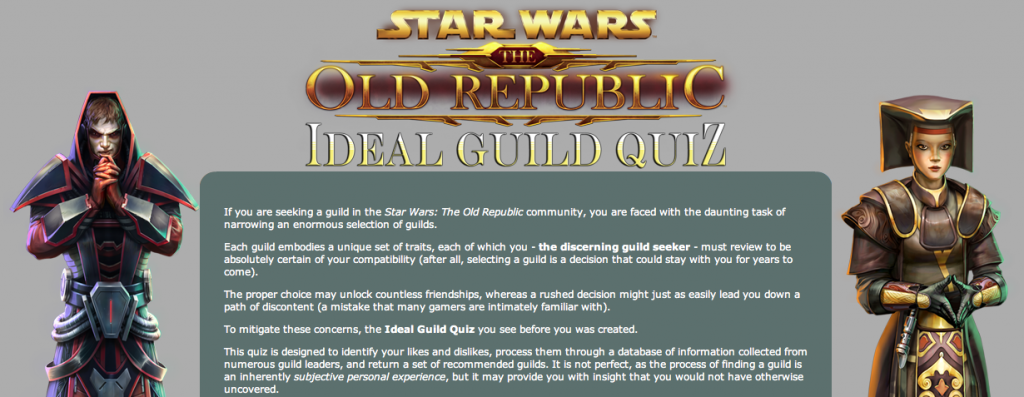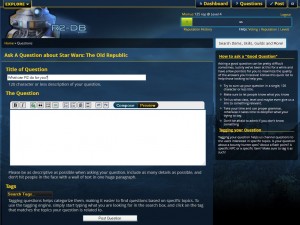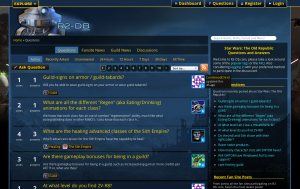Posted by Lethality | 1 Comment
The Ideal Guild Quiz – A SW:TOR Resource You Don’t Want To Miss
A while back, you may have caught a glance of the Ideal Guild Quiz. It’s a great tool spearheaded by Eternal Vigilance, a prominent Republic guild in Star Wars: The Old Republic.
Since the Guild Headquarters is going away on January 3rd, we thought this was a great time to catch up with them and find out a little more about this resource for players who are looking for a great guild.
Read on to learn more about it and how you can make it better!
Read MorePosted by TwinHits | 3 Comments
United We Stand: Message For You, Sir!
United We Stand is an Ask A Jedi series focusing on guilds, groups, and other communities in Star Wars: The Old Republic. By examining the communities that we form, we can create a stronger game for ourselves, build relationships that will last a lifetime, and perhaps even change the world itself.
Six weeks from now, we’re starting on a grand adventure, one that will likely change many of our lives forever. We’re not going to be alone though, everyone else is going to be there with us. Thus, the next six articles are going to focus on how to design a guild from the ground up, how to market your guild, how to make it an effective organization, and how to reach your goals. This plan goes right along with Ask A Jedi’s amazing new column Council Chambers written by the very talented Lady Republic, which deals with day to day problems and solutions for guild officers.
Before we get into that fancy topic, I want to give you aspiring guild leaders and officers probably the best and most useful advice I can possibly give, for beside all the cool ideas and theories we discuss here there will be nothing more useful then what I am about to say: You cannot do this alone. Before anything else, you must find one other person who completely shares your vision with you. This person will be incredibly valuable to you both as an advisor, a friend, and your greatest supporter. Once your guild becomes successful, you will never forget what they have done for you.
Read MorePosted by TwinHits | 24 Comments
United We Stand: Here Comes Democracy
United We Stand is an Ask A Jedi series focusing on guilds, groups, and other communities in Star Wars: The Old Republic. By examining the communities that we form, we can create a stronger game for ourselves, build relationships that will last a lifetime, and perhaps even change the world itself.
An issue once came up when I was a clan leader in Star Wars: Jedi Academy, and the council didn’t really know what to do. So, we put it to a vote for the whole clan. This may seem like a really simple statement, but there is actually a lot of meaning behind it. Why does it immediately occur to us to put the issue to a vote? We are the council, tasked with protecting the clan and making its decisions. We should just be making a decision on behalf of the clan and moving on, there’s no need for the voice of the members in this process. Yet, for some reason, in our online communities we always wedge the vote into our system, even when it doesn’t belong. It may be the very basis of the governing system, a last resort measure, or simply the method the ruling council, but there’s always the scared vote.
Why is this important? Because democracy is a terrible way to govern a guild. Sean “Dragons” Stalzer in his book The Legend of the Syndicate says that when he designed the system governing the Syndicate that he specifically chose to forge a benevolent dictatorship. Seeing as how successful the Syndicate has been, I think that we can define that as a good choice. It also just makes sense, a single leader with a single vision will be able to lead and make decisions for a guild better then a group of people with slightly differing, or even competing, visions. Yet we still think the vote is important and include it anyway.
Read MorePosted by TwinHits | 6 Comments
United We Stand: Too Young to Takeover, Too Old to Ignore
United We Stand is an Ask A Jedi series focusing on guilds, groups, and other communities in Star Wars: The Old Republic. By examining the communities that we form, we can create a stronger game for ourselves, build relationships that will last a lifetime, and perhaps even change the world itself.
I don’t think that we can possibly hammer the point home enough: guilds are actually important and you find evidence for this in the most surprising places. Awhile ago for a class, we had to read a book by Henry Brady, Sidney Verba, and Kay Schlozman called Voice and Equality. Apparently it’s a really important book in political science, but I don’t care. I only read one chapter on their Civic Volunteerism Model and how non-political groups can teach civic participation skills. Immediately, I thought to myself, “Gee, I wonder if this happens in guilds too?”
Idea is that “the institutional affiliations of adults -on the job, in non-political organizations, and in religious institutions – provide additional opportunities for the acquisition of politically relevant resources and the enhancement of a sense of psychological engagement with politics.” If this is true, then I think that we can expect these effects from guilds too, particularly because guilds are organizations with structures, hierarchies, and governing systems. Furthermore, this is particularly important because the populations of guilds are on average younger and they encounter these “institutional affiliations” earlier.
Guilds provide members with the opportunity for both acquisition of “politically relevant resources and a psychological engagement with politics” through its day to day activities. The guild’s officers have to exercise leadership skills, both in terms of game play and in terms of organizational management. The guild leader is using all the same skills that a manager might use in an office, but instead of focusing on getting TPS reports in on time, he is focusing on making sure that there are enough members online tonight for their latest attempt to clear the Eternity Vault. Just like churches, unions, and other voluntary associations can teach civic skills through participation, so can guilds by giving members opportunities to aid in complicated coordinated action.
According to Verba, Schlozman, and Brady, invitation through a voluntary association is one of the most common ways that someone is invited to participate politically by volunteering, giving money, or voting. Guilds can also serve this function, since they operate entirely the same way. “Not only are these institutions the training ground for civic skills, but they also function as a site for political recruitment and nurture political engagement.” An awesome survey was administered by Joesph Kahne, Ellen Middaugh, and Chris Evans and they found that “simulations of civic and political activities and learning how government, political, economic, and legal systems work provide young people with knowledge and skills necessary to participate in the political system.” More fascinatingly, they found that “youth who reported organizing or managing a guild group were more civically and politically engaged in their offline lives.”
Leading and participating in guilds in online games teaches political skills like leadership and civic participation. This is a really big deal, it means that there is more to guilds then just loot and DKP, more then just a group of friends gathering online. They actually have an effect; they are actually teaching valuable lessons to those that play these games. On whom are they having the most effect on? Well, people like you and I who had our first experiences with guilds at a young age, and now we’re much older and have learned so much. Now the question is what kind of effect is this going to have on society as a whole.
Leave comments or tweet me @TwinHits with your thoughts, ideas, and stories about guilds, communities, and leadership in Star Wars: The Old Republic.
Read MorePosted by Momus | 2 Comments
Got Questions? R2-Db Has Answers!
There are many questions to ponder while one fiddles about on the information super-highway. Questions such as, what are the seven words that you cannot say on TV? Was Caligula really that bad? Who won – the Hatfields or the McCoys?
For those with a more focused approach, or, more pertinently, looking for answers to their TOR related queries, R2-Db has ’em! Or, at least a series of answers predicated on the question being asked. R2-Db, in case you’re not aware, is the preeminent database for Star Wars: The Old Republic. Come launch, you’ll be there every day. Trust me.
Besides the incredible database, another major feature is the Questions system. The system is very cool and very straightforward. The first thing you need to do is sign in (if you don’t already have an account on R2-Db you’re missing out – not to mention the resource it will be come launch!) Then, go to the Questions page, and post your specific request for knowledge. As R2-Db is as much user-generated as database-driven, you’ll get an answer from someone who knows what they’re talking about.
The system leverages the strength of the social network, and you can up-vote or down-vote the various questions and answers. Doing this makes these items rise to the top (or sink to the bottom) thereby adding value and context to the information that’s available. Asking for obscure information on a minor character in the extended universe might not get you very far, but you can always try your luck; however if you keep it TOR-focused your chances are good!
Perhaps the best part is the pervasive tagging system for quickly finding information. Considering the droves of questions an MMO tends to produce, being able to search through questions and answers based on tags (i.e. like tagging “Mankrik” and “Barren’s quests” and “where is”) should reduce the amount of time it takes to find what you’re looking for.
The system relies on participation, so don’t hesitate – jump on over and start asking (or answering!)
R2-Db has a lot of other interesting features as well, including a reputation system where you earn reputation for providing good answers and asking good questions. Gaining reputation causes you to “level up” which unlocks features and other perks on the site! Getting involved now means more points, and being in a better position to give good feedback, both on comments and, of course, in the answers! So head over, die hard database junkies, and enjoy.
Read MorePosted by TwinHits | 2 Comments
United We Stand: Here Comes Everybody
United We Stand is an Ask A Jedi series focusing on guilds, groups, and other communities in Star Wars: The Old Republic. By examining the communities that we form, we can create a stronger game for ourselves, build relationships that will last a lifetime, and perhaps even change the world itself.
This past week I was rereading Clay Shirky’s Here Comes Everybody, and I was reminded of how kickass of a time we live in. Seriously: the development of the internet into a ubiquitous tool, the development of the personal computer, and of course most importantly the creation of the MMORPG. Not only is this time cool, but it’s really important as well. We don’t know what kinds of changes that these new technologies are going to bring; all we know is that they are coming. “The politics get interesting when the technology gets boring.” If you have to read this book for a class, it’s wonderful, although this article will probably give you enough to get away with not reading it.
Read More





